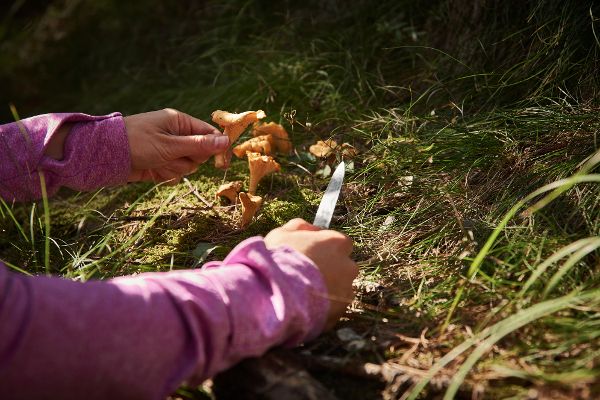Is it allowed to gather mushrooms and berries in forests?

Mushrooms, berries and other forest fruits (e.g. sweet chestnuts) are generally the property of the forest owner.
Who do mushrooms belong to?
According to § 354 and § 405 of the Austrian Civil Code (ABGB) mushrooms, berries and other forest fruits (e.g. sweet chestnuts) are principally the property of the forest owner.
However, if the forest owner does not expressly prohibit or restrict the gathering of mushrooms or forest fruits (e.g. by means of information boards) or demand payment for it, the acquisition of mushrooms and fruits is permitted under civil law and free of charge. The forest owner's consent to collection (for personal use) can be assumed if the forest owner tacitly tolerates it. Anyone picking mushrooms or forest fruits in spite of a prohibition by the forest owner can be sued by the latter under civil law. The forest owner can take illegally collected mushrooms or fruits from the collector for the purpose of self-help.
Current provisions on mushroom gathering in the Forest Act and in the nature conservation legislation of the Federal Provinces
If the forest owner has prohibited or restricted the gathering of mushrooms or forest fruits under private law, such prohibition or restriction takes precedence over the public law provisions in forest law and nature conservation law. In this case, the maximum amount of 2 kg of mushrooms per person and day as provided for in the Forest Act (see below) does not apply.
However, even in cases where gathering has not been restricted or forbidden by the forest owner the following public law provisions, which provide for various restrictions or bans, must be observed:
Forest Act 1975 (ForstG)
The ForstG provisions on the gathering of mushrooms and forest fruits serve to protect the forest soil and the biological balance of the forest. According to the ForstG (§ 174 para. (3) lit. b (2) and lit. d) an administrative offence is committed in the case of
- unauthorised obtaining of mushrooms to a quantity of more than 2 kilogrammes per day;
- conducting or participating in mushroom or berry collection events;
- unauthorised obtaining of fruit or seed of the woody plants listed in the appendix to the Forest Act for the purpose of profit.
“Unauthorised” persons according to § 174 para. (5) include, in particular, those who are neither owners of the forest, persons entitled to usufructuary rights or rights of use nor persons acting on their behalf or with their knowledge.
These prohibitions have to be controlled by the forest authority and the forest protection officers (auxiliaries of the forest authority); mushrooms or forest fruits gathered in contravention of the prohibition can be seized. This control may also be conducted by public security officers (police).
Nature conservation legislation of the Federal Provinces:
In the Federal Provinces, the nature conservation aspect of mushroom gathering and the gathering of forest fruits is regulated in ordinances according to the nature conservation laws (so-called “Mushroom Ordinance“, “Mushroom Protection Ordinance“, “Nature Conservation Ordinance“, “Species Protection Ordinance“, etc.):
In protected areas (national parks, nature reserves, etc.) mushroom gathering may be restricted or completely prohibited.
Certain mushrooms may be fully protected in the Provinces, e.g. in Upper Austria, and therefore must not be collected, damaged, destroyed, acquired, passed on, transported, sold or offered for sale.
Moreover, some Provinces regulate the use of (partially protected) mushrooms in more detail, mostly in so-called mushroom protection ordinances, and for example impose time restrictions for mushroom gathering.
In Carinthia, for example, partially protected mushrooms (such as "Herrenpilz" and "Eierschwammerl") may only be collected in the period from 15 June to 30 September from 7 a.m. to 6 p.m. As in the ForstG, the quantity is limited to 2 kg per person and day. Also the purchase, transfer, transport or trade of these mushrooms is only permitted up to this quantity. Exceptions exist for certain enterprises, like commercial enterprises.
In Salzburg, the gathering of mushrooms for sale is generally subject to a permit from the district administrative authority.
As nature conservation law falls within the legislative and executive competence of the Provinces, it is recommended to contact the respective provincial government office for such regulations on the use of mushrooms (and wild berries), if necessary.
Is it allowed to offer the mushrooms and berries you gathered for sale?
In this case other legal provisions, such as commercial law or nature conservation law, have to be observed.
Is it allowed to take mushrooms and berries collected by oneself to Italy or any other neighbouring country?
Provided that they were collected in compliance with the legal situation described (ForstG, nature conservation law, civil law); in any casy the customs regulations would have to be observed.
Legal basis - Federal law
- Forest Act 1975), Federal Law Gazette No 440, as last amended by Federal Law Gazette I No 56/2016 "Rechtsinformationssystem"
Provincial law
Carinthia
• Mushroom Ordinance, Provincial Law Gazette No 35/2014
Salzburg
• Mushroom Protection Ordinance, Provincial Law Gazette No 47/1994
Tyrol
• Tyrolean Mushroom Protection Ordinance 2005, Provincial Law Gazette No 68/2005.
Vorarlberg
• Nature Conservation Ordinance, Provincial Law Gazette No 8/1998
Upper Austria
• Species Protection Ordinance, Provincial Law Gazette No 73/2003
Other laws and ordinances: Please consult the legal information system of the Federal Government at www.ris.bka.gv.at.
Contact
Federal Ministry of Agriculture, Forestry, Regions and Water Management
Directorate III 2 - Forest Legislation, Legal Policy and Vocational Qualification
Marxergasse 2
1030 Vienna
Director Mag. Katharina Kaiser
Phone: +43 1 711 00 - 606681